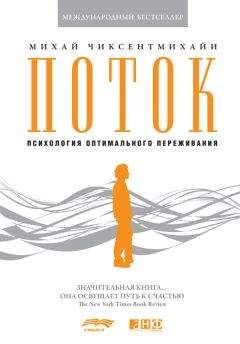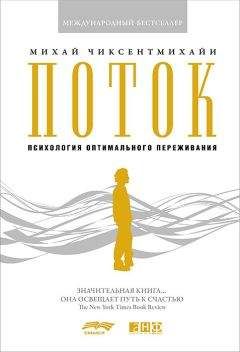Csikszentmihalyi M., Graef R. 1979. Flow and the quality of experience in everyday life. Unpublished manuscript, University of Chicago.
Csikszentmihalyi M., Graef R. 1980. The experience of freedom in daily life // American Journal of Community Psychology. V. 8. P. 401–414.
Csikszentmihalyi M., Kubey R. 1981. Television and the rest of life // Public Opinion Quarterly. V. 45. P. 317–328.
Csikszentmihalyi M., Larson R. 1978. Intrinsic rewards in school crime // Crime and Delinquency. V. 24. P. 322–335.
Csikszentmihalyi M., Larson R. 1984. Being adolescent: Conflict and growth in the teenage years. New York: Basic Books.
Csikszentmihalyi M., Larson R. 1987. Validity and reliability of the Experience-Sampling Method // Journal of Nervous and Mental Disease. V. 175 (9). P. 526–536.
Csikszentmihalyi M., Larson R., Prescott S. 1977. The ecology of adolescent activity and experience // Journal of Youth and Adolescence. V. 6. P. 281–294.
Csikszentmihalyi M., LeFevre J. 1987. The experience of work and leisure // Third Canadian Leisure Research Conference. May 22–25. Halifax, N. S.
Csikszentmihalyi M., LeFevre J. 1989. Optimal experience in work and leisure // Journal of Personality and Social Psychology. V. 56 (5). P. 815–822.
Csikszentmihalyi M., Massimini F. 1985. On the psychological selection of biocultural information // New Ideas in Psychology. V. 3 (2). P. 115–138.
Csikszentmihalyi M., Nakamura J. 1989. The dynamics of intrinsic motivation // Handbook of motivation theory and research. V. 3 / R. Ames, C. Ames (eds.). New York: Academic Press. P. 45–71.
Csikszentmihalyi M., Rathunde K. 1989. The psychology of wisdom: An evolutionary interpretation // The psychology of wisdom / R. J. Sternberg (ed.). New York: Cambridge University Press.
Csikszentmihalyi M., Robinson R. 1990. The art of seeing. Malibu, Calif.: J.P. Getty Press.
Csikszentmihalyi M., Rochberg-Halton E. 1981. The meaning of things: Domestic symbols and the self. New York: Cambridge University Press.
Culin S. 1906. Games of North American Indians // 24th Annual Report. Washington, D.C.: Bureau of American Ethnology.
Cushing F.H. 1896. Outlines of Zuni creation myths // 13th Annual Report. Washington, D.C.: Bureau of American Ethnology.
Dalby L.C. 1983. Geisha. Berkeley: University of California Press.
Damon W., Hart D. 1982. The development of self-understanding from infancy through adolescence // Child Development. V. 53. P. 831–857.
Dante A. 1965. The divine comedy / Trans. G.L. Bickerstein. Cambridge: Harvard University Press. Рус. пер.: Данте А. Божественная комедия / пер с итал. М. Лозинского. – М.: Наука, 1967.
David F.N. 1962. Games, gods, and gambling. New York: Hafner.
Davis J.A. 1959. A formal interpretation of the theory of relative deprivation // Sociometry. V. 22. P. 280–296.
Dawkins R. 1976. The selfish gene. New York: Oxford University Press. Рус. пер.: Докинз Р. Эгоистичный ген. – М.: Мир, 1993.
deCharms R. 1968. Personal causation: The internal affective determinants of behavior. New York: Academic Press.
Deci E.L., Ryan R.M. 1985. Intrinsic motivation and self-determination in human behavior. New York: Plenum Press.
Delle Fave A., Massimini F. 1988. Modernization and the changing contexts of flow in work and leisure // Optimal experience: Studies of flow in consciousness / M. Csikszentmihalyi, I. S. Csikszentmihalyi (eds.) New York: Cambridge University Press. P. 193–213.
De Roberty E. 1878. La sociologie. Paris. Рус. пер.: Де Роберти Е. Социология. – СПб.: Тип. М.М. Стасюлевича, 1880.
de Santillana G. 1961 / 1970. The origins of scientific thought. Chicago: University of Chicago Press.
Devereux E. 1970. Socialization in cross-cultural perspective: Comparative study of England, Germany, and the United States // Families in East and West: Socialisation process and kinship ties / R. Hill. R. Konig (eds.) Paris: Mouton. P. 72–106.
Diener E. 1979. Deindividuation: The absence of self-awareness and self-regulation in group members // The psychology of group influence / P. Paulus, (ed.). Hillsdale, N.J.: Erlbaum.
Diener E. 1979. Deindividuation, self-awareness, and disinhibition // Journal of Personality and Social Psychology. V. 37. P. 1160–1171.
Diener E., Horwitz J., Emmons R.A. 1985. Happiness of the very wealthy // Social Indicators Research. V. 16. P. 263–274.
Dobzhansky T. 1962. Mankind evolving: The evolution of the human species. New Haven: Yale University Press.
Dobzhansky T. 1967. The biology of ultimate concern. New York: New American Library.
Draghicesco D. 1906. Du role de I'individu dans le determinisme social. Paris.
Dulles F. R. 1965. A history of recreation: America learns to play. 2d ed. Englewood Cliffs, N. J.: Prentice-Hall.
Durkheim E. 1897 / 1951. Suicide. New York: Free Press. Рус. пер.: Дюркгейм Э. Самоубийство. Социологический этюд. – М.: Директмедиа Паблишинг, 2007.
Durkheim E. 1912 / 1967. The elementary forms of religious life. New York: Free Press. Рус. пер.: Дюркгейм Э. Элементарные формы религиозной жизни // Мистика. Религия. Наука. Классики мирового религиоведения. Антология / пер. с англ., нем., фр.; сост. и общ. ред. А. Н. Красникова. – М.: Канон+, 1998.
Easterlin R.A. 1974. Does economic growth improve the human lot? Some empirical evidence // Nations and households in economic growth / P.A. David, M. Abramovitz (eds.) New York: Academic Press.
Eckblad G. 1981. Scheme theory: A conceptual framework for cognitive-motivational processes. London: Academic Press.
Ekman P. 1972. Universals and cultural differences in facial expressions of emotions // Current theory in research on motivation, Nebraska symposium on motivation. V. 19. Lincoln: University of Nebraska Press. P. 207–283.
Eliade M. 1969. Yoga: Immortality and freedom. Princeton: Princeton University Press.
Emde R. 1980. Toward a psychoanalytic theory of affect // The course of life / S. Greenspan, E. Pollack (eds.). Washington, D.C.: U.S. Government Printing Office.
Encyclopaedia Britannica. 1985. 15th ed. Chicago: Encyclopaedia Britannica, Inc.
Erikson E.H. 1950. Childhood and society. New York: W.W. Norton. Рус. пер.: Эриксон Э. Детство и общество / пер. с англ. и науч. ред. А А. Алексеев. – СПб.: Летний сад, 2000.
Erikson E.H. 1958. Young man Luther. New York: W.W. Norton. Рус. пер.: Эриксон Э. Молодой Лютер. Психоаналитическое историческое исследование / пер. с англ. А. М. Каримского. – М.: Медиум, 1996.
Erikson E H. 1969. Gandhi's truth: On the origins of militant nonviolence. New York: W. W. Norton.
Evans-Pritchard E.E. 1940 (1978). The Nuer. New York: Oxford University Press. Рус. пер.: Эванс-Причард Э. Нуэры: Описание способов жизнеобеспечения и политических институтов одного из нилотских народов / отв. ред Л.Е. Куббель. – М.: Наука, 1985.
Eysenck M.W. 1982. Attention and arousal. Berlin: Springer Verlag.
Ferenczi S. 1950. Sunday neuroses // Further contributions to the theory and technique of psychoanalysis / S. Ferenczi (ed.) London: Hogarth Press. P. 174–177.
Fine R. 1956. Chess and chess masters // Psychoanalysis. V. 3. P. 7–77.
Fiore G. 1973. Antonio Gramsci: Life of a revolutionary. New York: Schocken Books.
Fisher A.L. 1969. The essential writings of Merleau-Ponty. New York: Harcourt Brace.
Fortune R.F. 1932 / 1963. Sorcerers of Dobu. New York: Dutton.
Fox V. 1977. Is adolescence a phenomenon of modern times? // Journal of Psychiatry. V. 1. P. 271–290.
Frankl V. 1963. Man's search for meaning. New York: Washington Square. Рус. пер.: Франкл В. Сказать жизни «Да»! / под ред. Д. А. Леонтьева. – М.: Смысл; Альпина нон-фикшн, 2009.
Frankl V. 1978. The unheard cry for meaning. New York: Simon & Schuster.
Freeman M. 1989. Paul Ricoeur on interpretation: The model of the text and the idea of development // Human Development. V. 28. P. 295–312.
Freeman M., Larson R., Csikszentmihalyi M. 1986. Immediate experience and its recollection // Merrill Palmer Quarterly. V. 32 (2). P. 167–185.
Freeman M., Robinson R.E. In press. The development within: An alternative approach to the study of lives // New Ideas in Psychology.
Freud S. 1921. Massenpsychologie und Ich-Analyse // Vienna Gesammelte Schriften. V. 6. P. 261. Рус. пер.: Фрейд З. Психология масс и анализ человеческого «Я» // Фрейд З. Психоанализ и культура. Леонардо да Винчи. – СПб.: Алетейя 1997. С. 80–162.
Freud S. 1930 / 1961. Civilization and its discontents. New York: Norton. Рус. пер.: Фрейд З. Недовольство культурой // Фрейд З. Психоанализ. Религия. Культура. – М.: Ренессанс, 1992. С. 65–134.
Frijda N.H. 1986. The emotions. New York: Cambridge University Press.
Gallup G.H. 1976. Human needs and satisfactions: A global survey // Public Opinion Quarterly. V. 40. P. 459–467.
Gardner H. 1983. Frames of mind. New York: Basic Books.
Garrett H.E. 1941. Great experiments in psychology. Boston: Appleton Century Crofts.
Gedo M.M. (ed.) 1986–1988. Psychoanalytic perspectives on art. 1986. V. 1. 1987. V. 2. 1988. V. 3. Hillsdale, N. J.: Analytic Press.
Geertz C. 1973. The interpretation of culture. New York: Basic Books. Рус. пер.: Гирц К. Интерпретация культур. – М.: РОССПЭН, 2004.
Gendlin E.T. 1962. Experiencing and the creation of meaning. Glencoe: Free Press.
Gendlin E.T. 1981. Focusing. New York: Bantam. Рус. пер. Джендлин Ю. Фокусирование: Новый психотерапевтический метод работы с переживаниями. – М.: Независимая фирма «Класс», 2000.
General Social Survey. 1989 (March). Chicago: National Opinion Research Center.
Gergen K., Gergen M. 1983. Narrative of the self // Studies in social identity / T. Sarbin, K. Scheibe (eds.) New York: Praeger. P. 254–273.
Gergen K., Gergen M. 1984. The social construction of narrative accounts // Historical social psychology / K. Gergen, M. Gergen (eds.) Hillsdale, N.J.: Erlbaum. P. 173–189.
Getzels J.W., Csikszentmihalyi M. 1965. Creative thinking in art students: The process of discovery // HEW Cooperative Research Report S-080, University of Chicago.
Getzels J.W., Csikszentmihalyi M. 1976. The creative vision: A longitudinal study of problem finding in art. New York: Wiley Interscience.
Gilpin L. 1948. Temples in Yucatan. New York: Hastings House.
Gladwin T. 1970. East is a big bird: Navigation and logic on Puluat atoll. Cambridge: Harvard University Press.
Glick P.G. 1979. Children of divorced parents in demographic perspective // Journal of Social Issues. V. 35. P. 170–182.
Goertzel V., Goertzel M G. 1962. Cradles of eminence. Boston: Little, Brown.
Goffman E. 1969. Strategic interaction. Philadelphia: University of Pennsylvania Press.
Goffman E. 1974. Frame analysis: An essay on the organization of experience. New York: Harper&Row. Рус. пер.: Гофман И. Анализ фреймов: эссе об организации повседневного опыта / пер. с англ. под ред. Г. С. Батыгина и Л. А. Козловой. – М.: Институт социологии РАН, 2003.
Gombrich E.H. 1954. Psychoanalysis and the history of art // International Journal of Psychoanalysis. V. 35. P. 1–11.
Gombrich E.H. 1979. The sense of order. Ithaca, N.Y.: Cornell University Press.
Gouldner A.W. 1968. The sociologist as partisan: Sociology and the welfare state // American Sociologist. V. 3. P. 103–116.
Graef R. 1978. An analysis of the person by situation interaction through repeated measures. Unpublished doctoral dissertation, University of Chicago.
Graef R., Csikszentmihalyi M., Giannino S.M. 1983. Measuring intrinsic motivation in everyday life // Leisure Studies. V. 2. P. 155–168.
Graef R., McManama Gianinno S., Csikszentmihalyi M. 1981. Energy consumption in leisure and perceived happiness // Consumers and energy conservation / J.D. Clayton et al. (eds.) New York: Praeger.
Graves R. 1960. The white goddess: A historical grammar of poetic myth. New York: Vintage Books. Рус. пер.: Грейвс Р. Белая богиня. – Екатеринбург: У-Фактория, 2007.
Griessman В. Е. 1987. The achievement factors. New York: Dodd, Mead.
Groos K. 1901. The play of man. New York: Appleton.
Gross R. (ed.) 1982. Invitation to life-long learning. New York: Fowlett.





